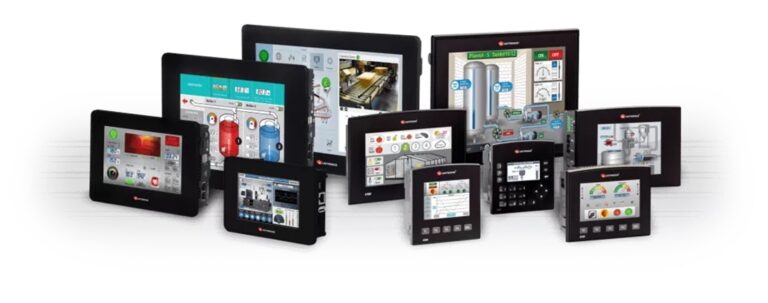A PLC Controller is an industrial computer control system that continually monitors input device status and controls output device state using a bespoke programme.
This control system may considerably improve almost any production line, machine function, or process. However, the most significant advantage of employing a PLC is changing and replicating an operation or process while gathering and communicating crucial data.
A PLC system also has the benefit of being modular. To best fit your application, you can mix and match the types of Input and Output devices. As a result, PLCs are used by businesses all over the world to automate their most vital activities.
PLCs and HMIs: Affordable and High Performance
Forming brand new machines for today’s smart factories necessitates advanced automation and control, which can only be achieved by combining components and solutions, such as a PLC, HMI, I/Os, and motion components like VFDs and AC Servo systems. Since all components must work concurrently, choosing the proper combination is critical to a project’s efficiency and subjugation.
The Unitronics family of high-end controllers that integrate full-function PLCs and HMI operating panels into single consolidated modules to create one of the most cost-effective controls packages are available from EMC.
Unitronics’ integrated automation and control solution is a better choice. A simple approach to eliminate headaches, save time, and have confidence that everything will function together exactly as you need it to while still having access to a wide range of components and configurations.
With Unitronics’ all-in-one strategy, you’ll only have to deal with one vendor, which means less time spent researching, easier ordering, more coordinated delivery, and a single point of contact for assistance. There’s also no sleuthing to locate the root of an issue and no pointing fingers between companies.
We concentrate on supplying high-performance PLCs at cheap costs. Our choices are fully customizable and include a touch screen and robust HMI functions. In addition, you’ll get access to cutting-edge free software with the PLCs we provide.
HMIs and PLCs
From sophisticated machinery to basic and cost-effective PLC control, Unitronics offers a full variety of PLCs with integrated HMI. Programmable controllers from the Unistream Series. For simple execution of difficult, complex undertakings.
- UniStream PLCs are available in three series: powerful, sophisticated, and award-winning.
- UniStream Modular All-in-One Customised Controllers allow you to choose the size of your HMI panel, plug in a CPU, and add I/O and COM modules to meet your needs.
- PLC, HMI, and I/Os are incorporated into a single device with UniStream Built-in All-in-One Controllers.
- UniStream PLCs with Virtual HMI: these PLC + I/O controllers have HMI software that you can use from your mobile device.
UniStream is written in UniLogic, a multi-award-winning single-environment programming package that can cut programming time in half.
The Benefits of Using PLCs
For decades, PLCs have been a standard feature of industrial machinery design. So what benefits of PLCs make them such a popular choice?
- Programming PLCs is quite simple. PLCs are ideal for firms who seek to reduce complexity and expenses by using simple programming languages compared to other industrial control systems.
- PLCs are a well-established technology that has been subjected to extensive testing and examination. It’s simple to obtain reliable information on various PLC types and thorough instructions on programming and integrating them.
- PLCs are available at various price points, including numerous low-cost, basic variants that small firms and startups frequently use.
- PLCs are incredibly adaptable, and the majority of PLC versions can operate a wide range of processes and systems.
- PLCs are solid-state electronics, meaning they don’t have any moving parts. As a result, they are extremely dependable and capable of withstanding the harsh conditions seen in many industrial buildings.
- PLCs have a small number of components, making them simple to troubleshoot and reducing maintenance downtime.
- PLCs are energy-efficient and do not consume a lot of electricity. This helps save electricity and may make wiring less complicated.
Many industries and applications have adopted programmable controllers as their principal automation solution because they provide accurate, dependable, and easily adaptable control.
Please contact us at +64 9 415 5110 to discuss PLCs and your requirements.


Comments are closed.